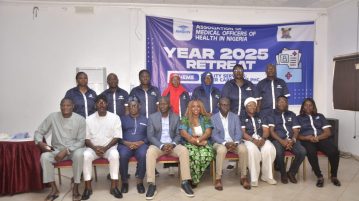Still following up on the turn of the unpleasant incident that occurred between the nurses and doctors about a year ago in OAUTHC, our correspondent reached out to key actors and stakeholders involved with the event, to find out what has changed, what has been done so far and if the situation of things surrounding the incident have improved.
Below are some of their responses to questions asked:
One year later, what was the outcome of the panel and joint action committee (JAC) set up? And what has changed from then till now?
“Honestly, nothing is coming out of it. The house officer was not keen on the stress of pursuing the case, and when she finished house job, she just wanted to move on. Plus, it was ARD versus the world, as the then CMD, committee chairman (who is a consultant) and NANNM struggled to sweep it all under the carpet. And in my opinion, the consultants should have unanimously stepped in and not joined to cover up the situation for “peace sake”.
Also, the nurse involved is actually a junior nurse and not yet a matron as earlier circulated. Although middle aged, she is influential and even ran for a political post in her state but lost. Normally, she’s actually a pleasant fellow who tends to greet a lot and is very chatty, because we work on the same ward. Really, I think it was just a case of interprofessional rivalry. She not accepting her job, not knowing when to draw the line and trying to put her “culture and age” over professional duties. Albeit, the incident did send a message across, at least no report of such occurrence has been made again, but I am just not pleased with the outcome”. ~ Female Medical Doctor in OAUTHC and Young Doctors Forum Coordinator, MWAN Osun.
When the Joint action committee (JAC) was initially set up, it was majorly made up of only physicians and headed by a consultant, which we vehemently stood against. As this already forms a basis for bias on whatever outcome would come from their investigations and decisions that would be taken. So, we insisted that neutral parties to the occurrence or other members of the healthcare professionals be included on the committee for fairness. And this was subsequently done, as the co-chair of the committee was a JOHESU member. ~ Male Nurse in OAUTHC and Executive, NANNM OAUTHC.
“I actually don’t like recounting that event, because it was sickening and nauseating in its entity. The way management in cahoots with the Joint action committee (JAC) leadership dealt with the issue was terrible. They were vehemently against the dispensation of justice on the matter, despite the fact that the aggressor in this case was clear to all.
Concerning the panel set up, it later came to light that Minister of state for health NEVER sent the head of discipline to represent him at any meeting. He only reverted to the reports sent from the board, the two minority reports by ARD and the other senior doctor on the panel. No copy of the final report was given or made public, and that was the end of the matter.
Initially, we were awaiting verdict from the FMOH – which we never got – only for participants on the panel to get a board commendation letter for their roles on the panel. Up until now, I am not aware of any punitive measure meted out to anyone. But after that occurrence, there were attempts at strengthening the security apparatus in the hospital”. ~ Male Medical Doctor in OAUTHC and Executive, ARD OAUTHC.
Likewise, of important note, another administrative male healthcare worker in OAUTHC added:
“The acting CMD then was keenly working towards becoming the substantive CMD, that he was been unduly diplomatic in his involvement with the members of JOHESU involved. But this caused a rift in the management and a lot of enmity among the leadership of the hospital. Especially because those standing for the “truth” and insisting for the right thing to be done seemed like they were against him or were being sponsored to discredit him and reduce his chances of emerging as substantive CMD.
Also, the senior doctor that stood his ground and equally wrote a minority report was recently made Acting CMD but another person was eventually selected for the position. Solely because JOHESU protested against his appointment, that the Permanent Secretary had to visit the institution for the issue to be resolved. All of these was subsequently linked back to his role on the panel, as his only offence. The victimization goes on and on”.
One year later, no justice served… Which way forward?
There were multiple actions and reactions surrounding that occurrence that we must separate and learn from. The “act of incarceration” should be addressed separately from the “negligence of duty” based on established workplace policies. Then legal steps against criminal offences identified should be taken up by the individuals affected or respective representative associations. These actions will serve as deterrent to others. ~ Young Doctor, NMA Lagos
Teaching hospitals should have clearly outlined job descriptions for all members of the healthcare team, especially the interns. We need to stop assuming everyone knows their roles and ensure every ward healthcare cadre’s job role is displayed openly on the wards. So that no one leaves their actual jobs to others and focus on intangible things. For instance, it is more common now for doctors (mostly house officers) to be found sorting out duties meant for porters, healthcare assistants or other attendants on the ward, while those healthcare support workers are running non-clinical and personal errands for themselves or nurses in charge. This on the long run slows down clinical operation and prompt delivery of care to patients. ~ Young doctor, OAUTHC
Civil education for everyone to actually know their rights and that of others, is important for healthcare professionals in Nigeria. Nurses especially need to be equipped with these knowledge and skills for clinical assertiveness, lobbying and advocacy, conflict resolutions and communication, to as well reinforce our professional values. ~ Female Nurse, Oyo state
It is easy to think that this happened to the house officer because she is female and younger, because I doubt if it would have been the same if the HO was male. However, beyond this vulnerability, the way younger colleagues are bullied, scolded, disrespected, intimidated and oppressed in the presence of our allied healthcare providers and other professionals is definitely contributory. As this trickle down into how these younger colleagues are perceived and treated by other hospital staff. Also, younger colleagues have consistently been made to carry out duties not meant within their purview – although most times this is to benefit the patients or hasten the delivery of care to them – then others begin to expect them to routinely continue to carry out those duties, which is not right. Therefore, senior Colleagues must do netter to dignify and stand by their younger colleagues always. ~ Female Doctor, MWAN Lagos
It is the system and culture of excellence that qualifies an institution as great. For me, getting the right persons with capacity and integrity into leadership is key. Because when is system is heavily compromised with unimaginable desperation for power only, nothing good can come out of it. ~ ARD Member, OAUTHC
One year later, what has changed? More recommendations for way forward?
The prevalent culture of poor education and lack of will to learn among nurses, doctors and other healthcare professionals must be addressed. Because this action in the western world could amount to felony, kidnapping (with intention to harm), conspiracy to kidnap and harm, mental, physical and verbal abuse, emotional torture and unlawful imprisonment. Which could get the nurse into prison or losing her licence, as well as costing the hospital millions in settlement for the legal case. An extreme scenario – where the person locked up is claustrophobic, develops a panic attack, suffer from intracranial bleed and die – could easily be painted.
Hence, to avoid such recurrence, Doctors (via NMA) must engage Nurses (via NANNM) constructively and progressively. This is very crucial at this point, as both cadres are supposed to be healthcare partners in progress and not allow enmity or conflict to thrive between them.
Following this occurrence, the hospital management via Servicom organised a training for the medical professionals in OAUTHC on proper waste disposal and management within the hospital. Which I think is a good thing that came from this, and such trainings should be done more frequently to equip the workers. ~ Chairman, NANNM-OAUTHC
Also, each professional need to critically appraise themselves, because there will always be bullies among the teams. At different times, many healthcare professionals have experienced this at their various workplaces and very unfortunately, this bullying is done by some “supposed” senior colleagues. Openly using vices such as intimidation, oppression and public scolding, even in the presence of other allied healthcare providers, hospital attendants and patients – who then think they can do the same to the medical professional been belittled by their own senior colleagues. This is just the outcome and a ripple effect of the seeds sown overtime. Collectively, healthcare professionals must desist from this act.
Another attempt to ensure justice is served as a matter of urgency is for medical associations (e.g., NMA, ARD) to put in place automatic lawsuits to sue assaulters (nurse, patients, relative) whether doctor(s) involved like it or not. This will also serve as precautionary tale to others.
Editor’s note:
Names were withheld for confidentially purposes and to avoid victimizations.



